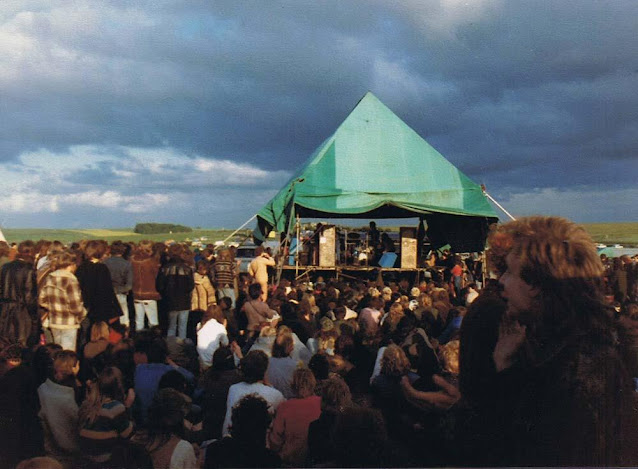AND
THE BANDS PLAYED ON
In a final farewell to
1982, for the paper's Christmas edition Penny Rimbaud was asked by
the NME to write about Punk in a year of revived patriotic fervour
and the Falklands war. Under the title 'Over A Thousand Dead And The
Bands Played On', Penny went for it:
'The debate continues
- is Punk dead? Was it ever alive? Who the fuck cares anyway?
Punk rejected media
lifestyles, exposed lies, upset tables in the temple of youth market.
Tired of exploitation by cynical elders, Punk discarded the
Jagger/Bowie mafiosa and reclaimed rock'n'roll revolution for itself;
the godfathers could sod off.
Punk was do it, make
it, take it, yourself. It never was a style, three-chord thrash was a
media misrepresentation, there was always more to it than that. Punk
was an attitude, "this time round we're all Elvis and fuck the
King".
Punk was about
personal politics. The Right and the Left wings tried to exploit it
and failed. The music business tried and succeeded. Cash speaks
louder than conviction.
Punk made many
promises, few were kept. Critics of stardom became stars, independent
became another word for subsidiary, anti-fashion became radical-chic,
mohicans bobbed with bouffants on Top Of The Pops. Those who only
played at revolution were devoured by the sharks and excreted as
commodity. Bought out, cleaned up and wrung dry, Pop Punk became a
sideshow in the media pantomime, another social joke. They deserved
everything they got... But did we?
1982 was 'Falklands
Year', over one thousand dead, but Thatcher was "proud to be
British", proud to be a part of that pointless slaughter, proud
because pride's a glossy surface that hides the guilt, shame and
lies. The media reinforced the lies. The dailies pumped out
hysterical, heroical crap. TV toed the party sham. Business was as
usual and the bands played on, superficial escapist drivel to cover
the pain.
However, beneath the
tinsel and stardust Punk lived on. Not Pop Punk - that remained at
best silent, at worst supportive of Thatcher’s barbaric little war
and was as dead as those who were sacrificed for her mean arrogance.
No. Punk lived anywhere that people got together to demand peace and
sanity, that's the real gig. Sometimes there was a band, sometimes
nothing but people and that's the crux of the matter, people not
musical fads or transitory fashion, just people, people who care -
and that's something the music business could never buy.
Rather than ignoring
the death and mutilation by turning up the stereo, the real Punks
were out protesting against Her Majesty's government's murder
machine. The music means no more than any other form of protest, it
should offer information and inspiration, not escape. The charts are
brainwash for the suckers. Punk's protest lives in the hearts and
actions of ANYONE with the courage to stand against the authorities
who oppress us ALL.
1983 is 'Cruise
Missile Year'. Thatcher and Reagan, naively believing that "the
threat of war is prevented by the threat of war", plan to make
Britain into a giant launch-pad for their nuclear armoury.
The Task Force was
Thatcher's international mask, Northern Ireland is the face beneath
it. Her national hand-out is three million unemployed, recession and
depression; the SPG and SAS are the fists she uses to deliver it. Do
you really trust this megalomaniac with your future? Are you prepared
to see life destroyed by the insanity of her and her government?
The world is a very
precious place, FUCK THE MUZAK, let's get on with the REAL job, there
may not be a second chance.
You've got the keys,
find your own fucking door.'









